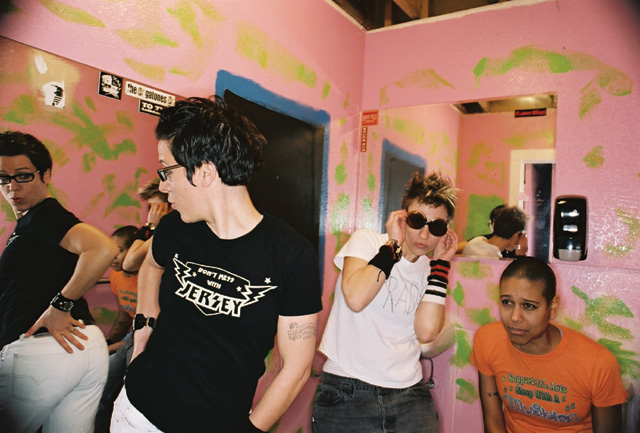mi-am amintit de niste rinduri scrise de mircea cartarescu la un moment dat:
Exista multe standarde pentru aprecierea gradului de civilizatie al unei societati. S-a vorbit despre cantitatea de sapun folosita anual, despre libertatile cetatenesti, despre calitatea invatamantului. … Dar eu cred ca unul dintre criteriile cele mai sensibile, care practic nu da gres niciodata, este felul in care, intr-o societate, femeia este privita si se priveste pe sine. Din acest punct de vedere, mai mult decat din toate celelalte, lumea romaneasca e una primitiva cu asupra de masura. Poate ca economia noastra o sa se acomodeze, cat de cat, in timp, cu cea europeana. Poate-o sa invatam mai multe limbi straine si-o sa renuntam la proverbiala noastra smecherie. Dar atata vreme cat nu respectam femeia de langa noi ca pe noi insine n-am facut nimic si nici n-o sa facem.
E inutil sa vin cu exemple din viata de zi cu zi, oricat ar fi de “picante“ sau de revoltatoare. Cu cat cobori mai mult in Romania profunda (care-ncepe dincolo de limitele unei mici lumi manierate si nu exclude nici universitari, nici ministri, nici alti oameni cu scoala si pretentii), cu atat sarcasmul impotriva femeii este mai mare. Vorbim azi cu oroare despre antisemiti si despre cei care mananca unguri pe paine, dar acestia sunt in Romania o (periculoasa) minoritate. Pe cand cei ce dispretuiesc femeia, care ii neaga tinuta morala sau intelectuala, care-o exclud sistematic din spatiul public sunt larga majoritate a romanilor de amandoua sexele. Nu rasismul sau sovinismul national sunt azi cea mai raspandita forma de discriminare, ci brutala sau discreta, instinctiva sau argumentata “stiintific“ discriminare a femeii. Pentru omul de rand (intrati in vorba cu taximetristii, de exemplu), “femeia nu e om“, “toate sunt curve cu exceptia mamei si surorii tale“, femeia la volan e o calamitate etc. Pentru autoritati, de asemenea, femeile sunt cetateni de rangul al doilea: codul lor numeric personal incepe (ce simbol mai bun sa gasim?) cu cifra 2… — “Nu avem primarite. Pacat!”, Jurnalul National, 29.6.04
chiar nu stiu ce i-a venit lui cartarescu, insa citind analiza asta in 2004 eu am fost in acelasi timp surprinsa de cit de bine si lucid puncta problema (ok, in afara de faptul ca rasistii nu sint chiar deloc o minoritate in romania – dar macar i-a numit “periculosi”), si complet ne-surprinsa ca articolul continua cu aceasta marturisire:
Ca orice ideologie, feminismul mi-e strain, desi ii recunosc necesitatea.
urmata de inca o declaratie din partea lui cartarescu, ca nu cumva sa mai ramina vreun dubiu (desi nu-l interogase nimeni):
In varianta lui radicala, [feminismul devine] la fel de odios ca orice alt sovinism. Nu observ toate cele de mai sus dintr-un punct de vedere feminist, ci pur si simplu din perspectiva bunului-simt.
da, sigur! eu n-am inteles niciodata: daca vezi ca ceva e necesar, de ce te-ai dezice de acel lucru (si oamenii fac asta foarte des)?! totusi, in cazul asta inteleg total, pentru ca din pacate problema e “built in”: a sustine feminismul ca ideologie si/sau ca practica inseamna ori sa n-ai acces ori sa intorci constient spatele la niste privilegii, prejudecati sau concesii care-ti fac viata mai usoara, indiferent daca realizezi ca sint nedrepte si daca ti se par impotriva firii si firii tale – inseamna, deci, a-ti asuma un risc, a nu disimula si a avea curaj. in fond recurgerea la sexism, in aceeasi masura cu inscrierea totala in rolurile de gen, este ceva ce garanteaza fiecarui om (femeie sau barbat) alinierea la mainstream si la valorile patriarhale pretuite dpdv social si cultural. in timp ce feminismul, anti-sexismul sint echivalente cu a merge impotriva curentului si traditiilor. adica lucrul cel mai greu.
cartarescu putea sa aleaga greul, pare sa inteleaga asta foarte bine, dar pina la urma alege clar cel-mai-usorul. mda. numai ca el se justifica spunind ca asta e de fapt o alegere “echilibrata” (ceea ce e ca si cum ai spune, de exemplu, ca ai vrea sa nu mai fie torturati oamenii dar tu nu vei merge atit de departe incit sa condamni tortura, deoarece nu vrei sa fii luat drept “extremist” – nu de alta, dar ai auzit pe undeva ca printre cei care se impotrivesc torturii sint tare multi ciudati si radicali).
newsflash to cartarescu: punctul respectiv de vedere este feminist. asa ca felicitari (imi pare rau). iar feminismul este bun-simt; daca ti s-a spus la televizor ca feminismul e doar de-un fel si este “sovinism”, mai inchide televizorul, nu te mai lasa spalat pe creier, informeaza-te, gindeste critic si fa ceva util – si eventual anti-sexist – cu timpul tau si talentele tale.
ce-i amuzant e ca, folosind “bun-simtul”, cartarescu descopera de unul singur definitia cea mai simpla a feminismului, adica: “notiunea radicala ca femeile sint oameni”. mai putin amuzanta: inconsecventa de care da dovada.
sa vedem, pe linga cartarescu insusi (in ipostaza explicit non-feminista), ce alte “exemple” care arata necesitatea feminismului ar mai fi?
…
si daca astea sint citeva din nenumaratele exemple, ce e “sovin” si ce e “de bun simt” dintre a imbratisa feminismul si a te dezice de el? (raspunsul intr-un numar viitor.)

